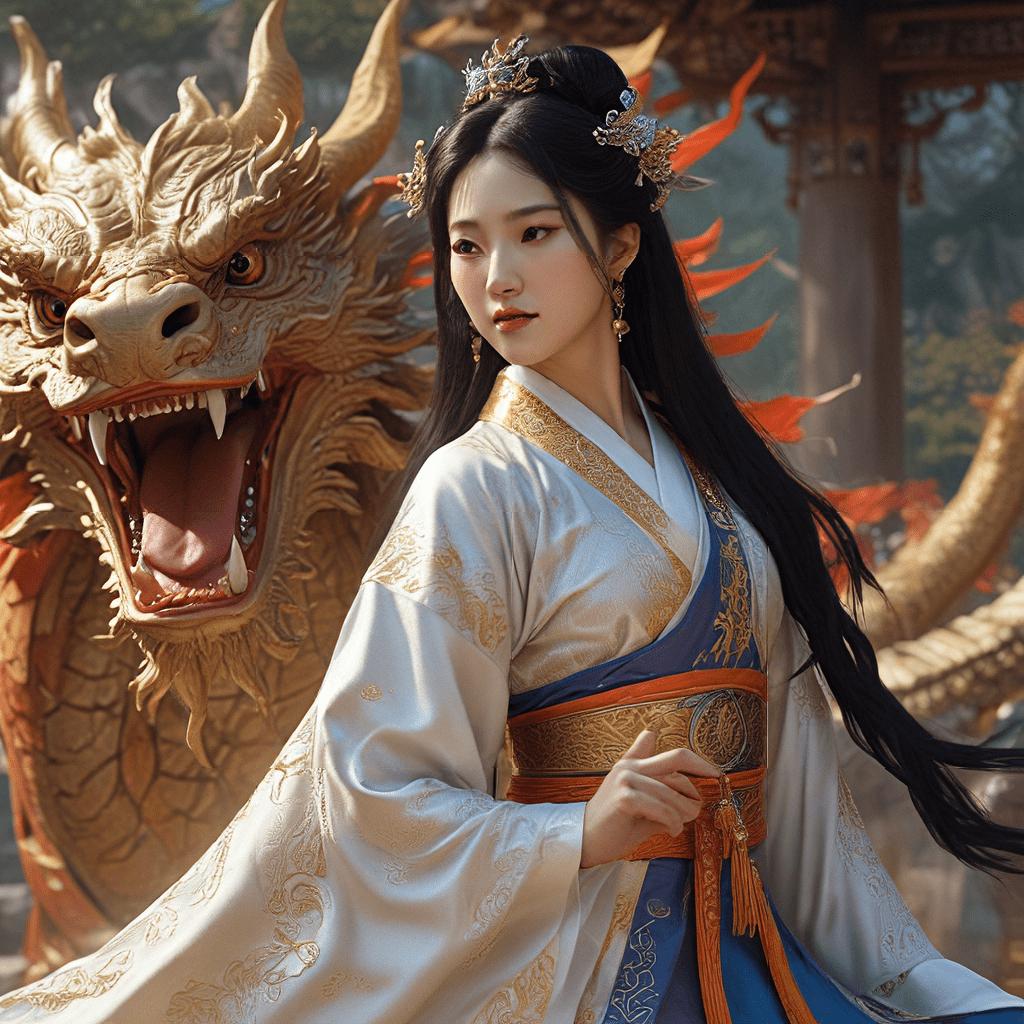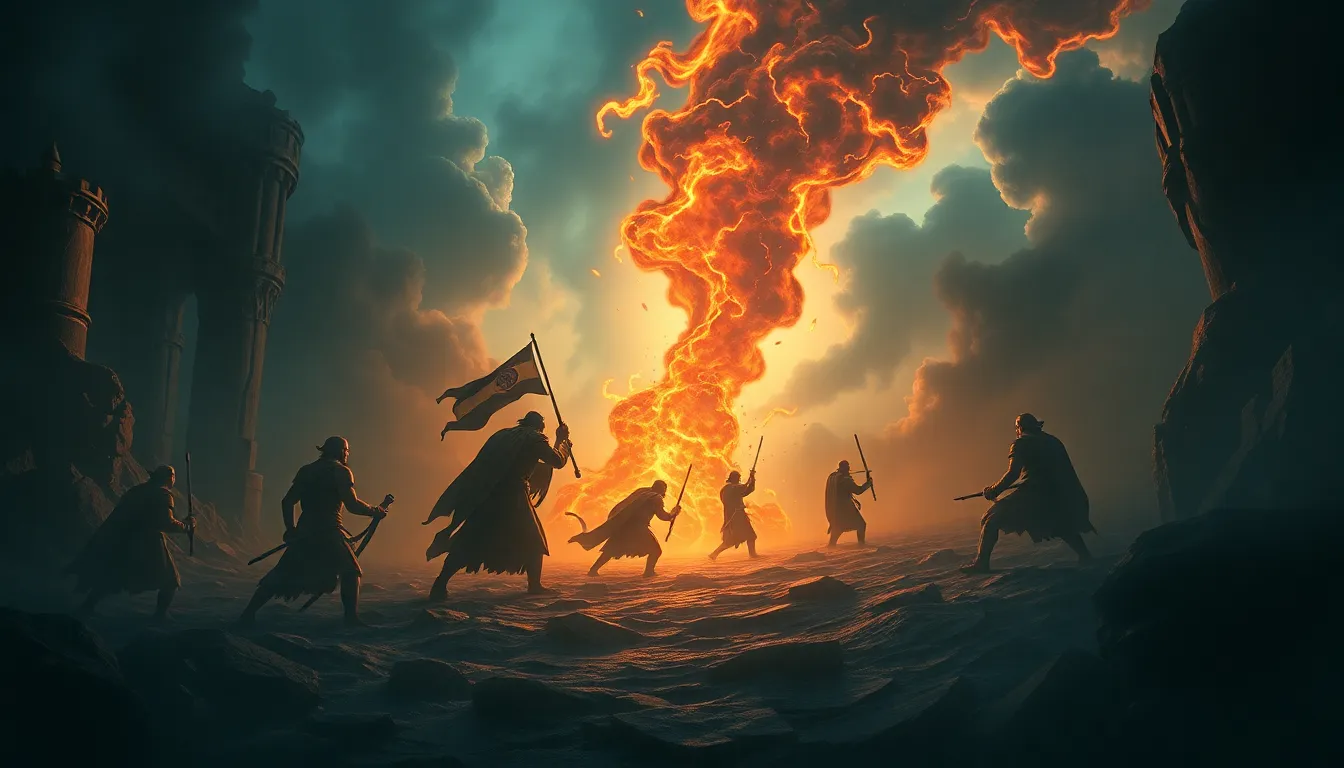The Dragon King’s Daughter: A Korean Myth of Love and Transformation
Delve into the captivating world of Korean mythology with the timeless tale of the Dragon King's Daughter. This enchanting story explores themes of forbidden love, transformation, and the delicate balance between the human and supernatural realms. The Dragon King's Daughter is a beloved legend that has been passed down through generations, captivating audiences with its compelling narrative and profound symbolism. This myth, deeply rooted in Korean folklore, serves as a reflection of cultural beliefs, societal values, and the enduring power of human emotions.
Origins in Korean Folklore
The Dragon King's Daughter originates from the rich tapestry of Korean folklore, which is brimming with tales of mythical creatures, supernatural beings, and fantastical adventures. The stories of Korean folklore serve as a window into the cultural heritage and beliefs of the Korean people. These tales are often passed down through oral traditions, weaving together elements of nature, spirituality, and the human experience. Within this rich tradition, the Dragon King's Daughter stands out as a powerful and evocative myth that continues to resonate with audiences today.
The Dragon King’s Daughter: A Story of Forbidden Love
The Dragon King's Daughter, a beautiful and ethereal being, finds herself drawn to a human man named Kim. Their love blossoms amidst the breathtaking scenery of the Korean countryside, but their forbidden romance faces a formidable obstacle: the Dragon King, her powerful and protective father. This forbidden love story is a common theme in Korean folklore. It reflects the tension between the natural and the supernatural, the human and the divine, and the complexities of love and longing.
The Dragon King and the Human Realm
In Korean mythology, the Dragon King reigns over the underwater realm, a powerful being who holds dominion over the seas and all its creatures. Known for his immense power and wisdom, he fiercely guards his daughter, fearing the dangers of the human world. The Dragon King represents the ancient connection between nature and the supernatural. He embodies the power and mystery of the underwater realm, a place of both beauty and danger.
The Serpent King: Symbolic Representations
The Dragon King, often portrayed as a serpentine creature, symbolizes not only power and wisdom but also the cyclical nature of life, death, and rebirth. The serpent, a recurring motif in Korean folklore, represents connection to nature, transformation, and the ability to shed old skin for a new beginning. This symbolism adds a layer of complexity to the story, highlighting the transformative nature of love and the potential for growth and change.
The Transformation of the Dragon King’s Daughter
In a dramatic turn of events, the Dragon King's Daughter, yearning for a life with the human man she loves, makes a life-altering decision. She chooses to leave behind her mythical heritage and embrace the human world. This act of transformation, often seen as a sacrifice, marks a turning point in the story. The Dragon King's Daughter, no longer bound by her dragon lineage, undergoes a physical and spiritual shift, adapting to life in the human realm.
This transformation isn't merely a change in appearance. It also represents a journey of self-discovery. The Dragon King's Daughter must learn to navigate the complexities of human relationships, customs, and emotions. This transformative journey speaks to the power of love to reshape identity and overcome societal barriers.
Themes of Identity and Belonging
The Dragon King's Daughter's tale explores the universal themes of identity and belonging. Her struggle to reconcile her mythical heritage with her human love highlights the challenges of navigating multiple identities. She must grapple with who she is – a daughter of the Dragon King, a being of the underwater realm, or a woman in love with a human.
This conflict reflects the experiences of many individuals who find themselves straddling different cultures, backgrounds, or social groups. The myth asks us to consider the complexities of identity and the search for a place where one truly belongs. The Dragon King's Daughter, in her pursuit of love and acceptance, embodies the human desire for connection and belonging.
The Role of Fate and Destiny
The Dragon King's Daughter's story also explores the age-old themes of fate and destiny. Her forbidden love with a human man, a seemingly impossible union, questions the boundaries of fate and the power of individual choice. Her journey highlights the tension between the predetermined path set by destiny and the human desire for agency and self-determination.
The story, through its depiction of forbidden love, suggests that love can sometimes defy fate, and individuals have the power to shape their destinies. The Dragon King's Daughter's courage to break free from her predetermined role as a mythical being and embrace a human life suggests the potential for individual agency, even within the framework of destiny.
The Dragon King’s Daughter: An Archetype of Sacrifice
The Dragon King's Daughter serves as an archetype of sacrifice, a recurring motif in many myths and legends across various cultures. She sacrifices her life in the underwater realm, her connection to her mythical origins, and her family ties to pursue her love for a human. This act of sacrifice highlights the power of love to inspire profound selflessness and the willingness to make difficult choices for the sake of one's beloved.
By choosing love over duty and tradition, the Dragon King's Daughter embodies the enduring power of sacrifice. Her act of selflessness underscores the importance of love and its ability to transcend boundaries and inspire acts of profound generosity. Her sacrifice becomes a testament to the enduring power of love and its ability to inspire transformative change.
Interpretations and Theories
The Dragon King's Daughter, like many myths and legends, has been subject to various interpretations and theories. Some scholars view the myth as a reflection of the cultural anxieties surrounding the blending of the natural and the supernatural. Others see it as a testament to the enduring power of love and its ability to inspire acts of extraordinary courage and self-sacrifice.
The myth's enduring appeal lies in its ability to resonate with different audiences and foster diverse interpretations. Its open-ended nature allows for different perspectives and interpretations, making it a timeless story that continues to inspire and provoke thought.
The Dragon King’s Daughter as a Symbol of Nature
The Dragon King's Daughter can also be interpreted as a symbol of the natural world, particularly the ocean. Her connection to the underwater realm, her father's role as the Dragon King, and her transition to the human world all reflect the interconnectedness of nature and humanity. The myth can be viewed as a reminder of the importance of respecting and preserving the natural world and its inhabitants.
The Dragon King's Daughter, through her journey of transformation and sacrifice, becomes a symbol of the delicate balance between the human and natural worlds. The story serves as a powerful reminder to live in harmony with nature and to recognize the interconnectedness of all living things.
FAQ
What is the Dragon King's Daughter?
The Dragon King's Daughter is a Korean myth that tells the story of a mythical being's forbidden love for a human. The tale explores themes of transformation, identity, belonging, fate, and sacrifice.
What are the main themes of the story?
The story explores themes of forbidden love, transformation, identity, belonging, fate, sacrifice, and the interconnectedness of nature and humanity.
What is the significance of the Dragon King in the story?
The Dragon King represents the power and wisdom of the natural world, particularly the ocean. He fiercely protects his daughter, embodying the tension between the mythical and human realms.
Why does the Dragon King's Daughter transform?
The Dragon King's Daughter transforms to embrace a life with the human she loves. Her transformation symbolizes the power of love to reshape identity and overcome societal barriers.
What is the significance of the Dragon King's Daughter's sacrifice?
Her sacrifice underscores the power of love to inspire selflessness and the willingness to make difficult choices for the sake of one's beloved. She represents an archetype of sacrifice, a recurring theme in many myths and legends.
What are some interpretations of the myth?
The myth has been interpreted as a reflection of cultural anxieties about the blending of the natural and the supernatural, as well as a testament to the power of love and sacrifice. It can also be viewed as a symbol of nature and the importance of respecting and preserving the natural world.



